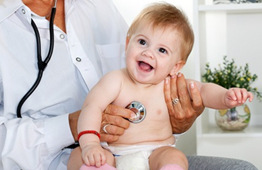When hormones prevent pregnancy

For women who suffer from PCO syndrome and want to become pregnant, a hormone treatment is available that restarts ovulation.
If women of childbearing age have an unfulfilled desire for children, one possible cause is polycystic ovary syndrome (PCO syndrome). Dr. Philipp Wiehle is head of the Endocrinology and Reproductive Medicine section in the Department of Obstetrics and Gynecology at the Medical Center – University of Freiburg. He explains how the disease can be recognized and treated.
The symptoms of PCO syndrome are diverse. "By definition, the women affected have longer menstrual cycles, or menstruation may even be completely absent. The consequences can range from reduced fertility to infertility. In addition, they often show signs of elevated male hormone levels, such as excess hair growth on the upper lip, chin and cheek, as well as on the thighs, abdomen, chest and back, plus acne. Loss of hair on the head can also occur," says the gynecologist. A sugar metabolism disorder can often be detected, which promotes weight gain up to morbid obesity of the male fat distribution type.
The increasing proportion of abdominal fat can in the long term cause severe cardiovascular diseases and diabetes, which is why it is important for women to recognize and treat the disease, even those who have no desire for children. In addition, the syndrome represents a heavy psychological burden for the women affected.
The exact disease trigger is still unknown
PCO syndrome upsets the hormonal balance, as a result of which immature ovocytes are no longer adequately stimulated to maturation, so that ovulation occurs only rarely or not at all. The ovaries, meanwhile, produce too much of the male hormone testosterone, which accumulates in the bloodstream.
In addition, insulin production is very often disrupted. The body's cells, which receive insulin via a messager substance in order to absorb sugar from the blood, do not process this message properly, and thus not enough blood sugar is removed. The pancreas reacts to this deficit with increased insulin secretion, in order to keep the sugar level aligned. The consequences of increased insulin in the blood must not be underestimated: fat formation in the liver rises, adipose tissue increases, and even more testosterone is created, intensifying the PCO syndrome's clinical picture.
An important step in the diagnosis of PCO syndrome is an accurate recording of the patient's medical history with a view to the symptoms described above. An ultrasound examination will also provide indications. "On the ultrasound image many small vesicles, so-called cysts, can be seen on the surface of the ovaries, which are arranged like a rosary on a string of beads," explains Dr. Wiehle. Determining blood hormone levels is also important for a reliable diagnosis. Other possible causes of the cycle disorder must be ruled out.
The disease usually begins between the ages of 15 and 25. In Germany, about one million women suffer from it. It is estimated that around five to ten percent of women of childbearing age are affected worldwide.
PCO syndrome cannot be cured, but can be treated very successfully. Dr. Wiehle recommends various therapeutic approaches, which differ primarily in whether or not there is a desire for children: "If the women do not wish to become pregnant, hormone treatment based antibacterial drugs can be offered. This effectively reduces male hormone levels, the increased body hair reverses and the complexion improves." The situation is different in women who want to become pregnant. In this case, a hormone treatment is offered which brings the ovulation cycle back into gear.
But the main focus is that those affected lose excess weight and improve their insulin resistance, via healthier nutrition and more exercise, supported medicinally if necessary. As weight decreases, the entire metabolic state improves significantly. "This is how PCO syndrome can be brought under control," says gynecologist Dr. Wiehle. "In many cases, regular menstruation even begins again on its own, so that the desire for children swiftly works out, with no further measures needed."
Back